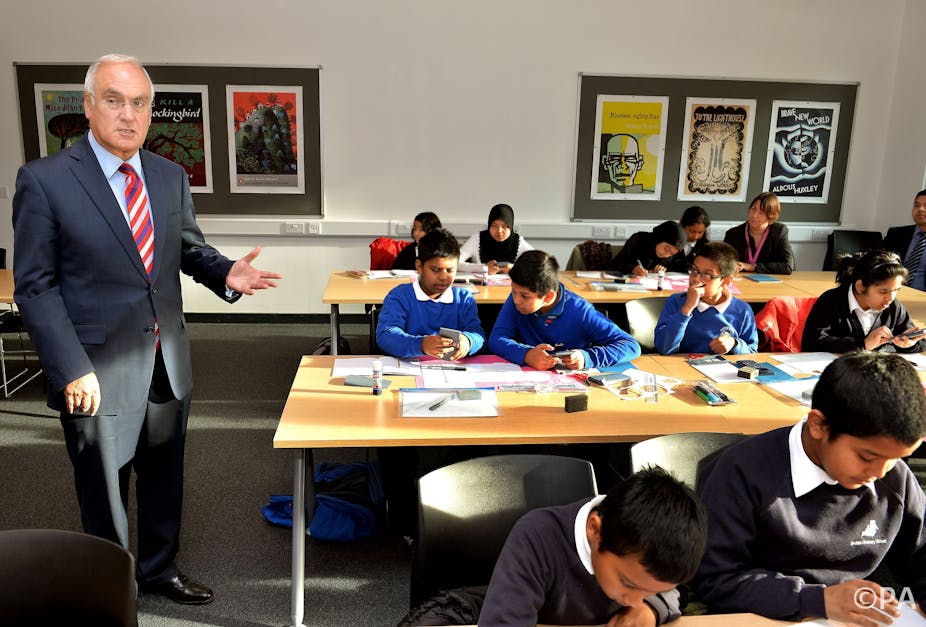There has been constant criticism levelled against Ofsted, England’s schools inspectorate, since its inception in 1992, most recently in a report from the think-tank Policy Exchange. Almost everyone in the education service agrees with the principle of school inspection – but so far that has been the limit of agreement.
Since Ofsted was founded there has been a bewildering succession of changes to its frameworks, procedures and protocols. This had led to opposing views of Ofsted as either the leading agency of school improvement or alternatively the purveyor of a “toxic brand” intimidating teachers and inhibiting rather the releasing the expertise of schools.
Do the changes proposed last week by the chief inspector of schools, Michael Wilshaw, represent more of the same or an important cultural shift?
At first glance they appear as organisational adjustments in response to the contestable assertion that the large majority of schools are now “good” or “outstanding” and therefore do not require the detailed, staff-intensive monolithic approach characteristic of Ofsted inspection since 1992.
Such schools are to be inspected less frequently and less intensively through an MOT-type approach. This will involve biennial visits from a single inspector who is to maintain a professional dialogue about progress with school leaders and governors.
In-depth, intensive inspection is to be targeted on those schools requiring varying degrees of improvement. The proposed system is being “marketed” as being able to provide Ofsted with more flexibility to respond to schools’ differing needs for intervention and support. It is claimed to be no less rigorous but to be more differentiated and to make optimum use of scarce and expensive inspector expertise.
Positive thinking
But are the proposals symptomatic of more than organisational change? Many of us long-standing critics of Ofsted hope so, and are welcoming what appears to be a major cultural shift developing within Ofsted itself and its relationship with the teaching profession.
After many years of ignoring criticism from teachers and academics, and resisting fundamental changes through a never-ending series of minor piecemeal adjustments, Ofsted is finally proposing major changes. It appears to be moving from what has too often been a negative approach, focusing on what is wrong and requires improvement, to a more supportive developmental one focusing far more on celebrating success in most schools. And crucially, how to work with those schools to make them even better.

That’s a profound mind-shift – which some inspectors will find difficult to make and which some school leaders will find hard to acknowledge after years of suspicion, anxiety and even hostility to Ofsted inspection teams. It will take more than a speech from the chief inspector to change attitudes on the part of the inspectors and the inspected. But his words on differentiated inspection need to be seen in the context of other potentially welcome initiatives.
There is a commitment to a thorough review of the system of contracting out most inspections to outside agencies –- perhaps in retrospect the most damaging and incomprehensible aspect of the original Ofsted “settlement” of 1992. The current inspection framework is to be re-examined with a view to making it more relevant to the changed educational landscape.
More inspectors are to be appointed and better quality assurance of inspection and training of inspectors are being promised. Inspectors have been reorganised on a regional basis and are being given a role in promoting school improvement, rather than just reporting on it through school reports. Franker, much more open lines of communication are being established between senior Ofsted managers and their critics through social and other media.
Time for teaching
There are very real benefits to the proposed changes. Perhaps most importantly they should enable many more schools to focus on the further improvement of teaching quality and educational standards rather than devoting disproportionate amounts of time preparing for inspection. Those schools requiring expert intervention are more likely to receive it.
The new arrangements should also improve Ofsted’s knowledge of local developments and better inform government of what is happening, including the effects of its policies on the education service as a whole.
Central to this re-orientation should be the development of a more flexible, more encompassing framework for inspection that can be validly and reliably applied to all types of school – free, academy, community and, ideally, independent.
That framework needs to be far less reliant on data, such as exam and inspection results, and to realise the limitations – as well as the usefulness – of that data. It also needs to give more recognition to the qualitative dimensions of school life and to place much more reliance on expert professional judgment by inspectors with experience of inspecting schools in a wide range of educational and geographical contexts.
Hopefully, one result would be the production of less formulaic, much more helpful inspection reports, which both school leaders and parents will find more closely tailored to the particular circumstances of their schools.
Changing the culture of Ofsted, including its relationship with schools, will not be easy. It will be met with suspicion, even denial, by those within and outside the organisation. But it does appear to be underway.

